

Expository Writing Worksheets

Topics of Facts

Expository Organizer

Explain Halloween

Building a Sandcastle

Expository Writing Planner
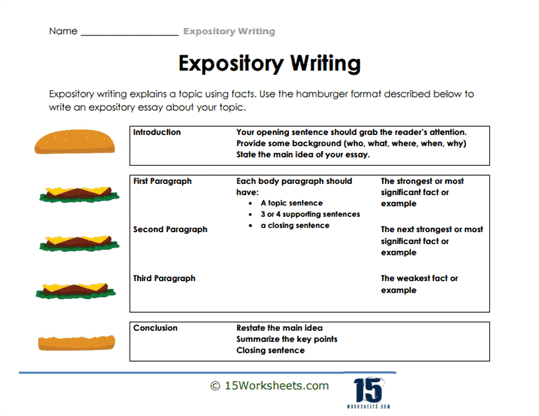
Hamburger Format
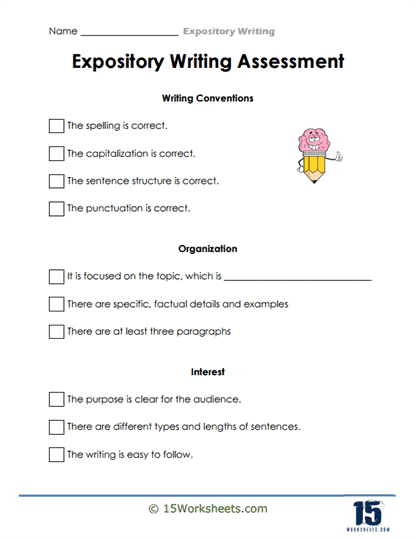
Conventions, Organization, Interest

The Expository Process
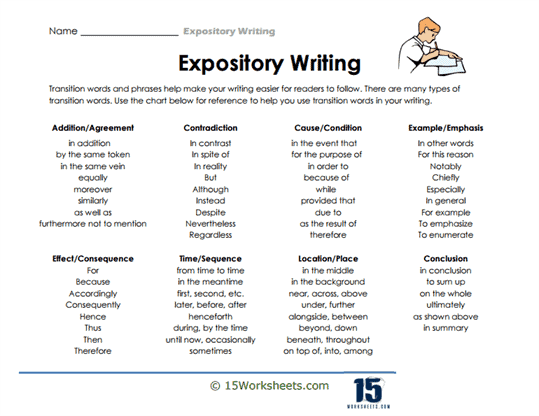
Transition Words and Phrases
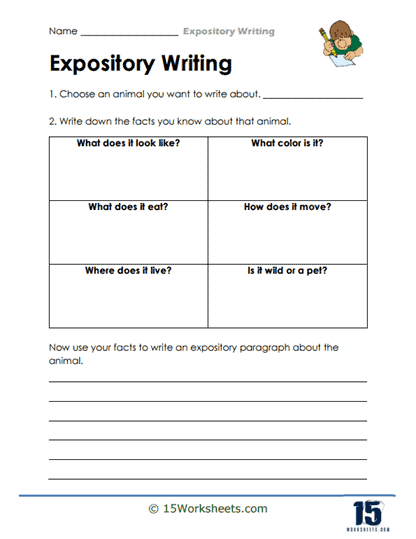
An Enjoyable Activity
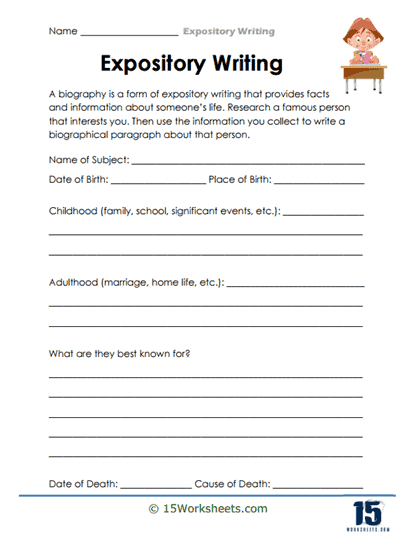
An Expository Biography
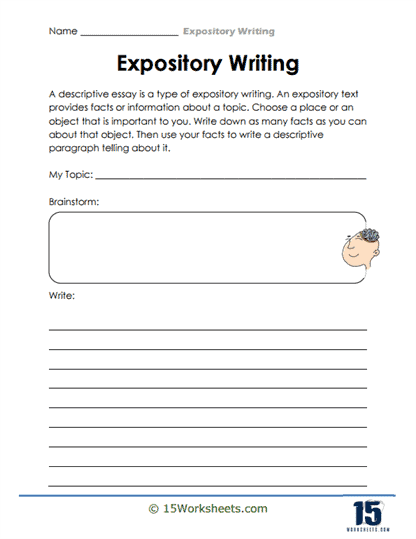
Expository Brainstorms
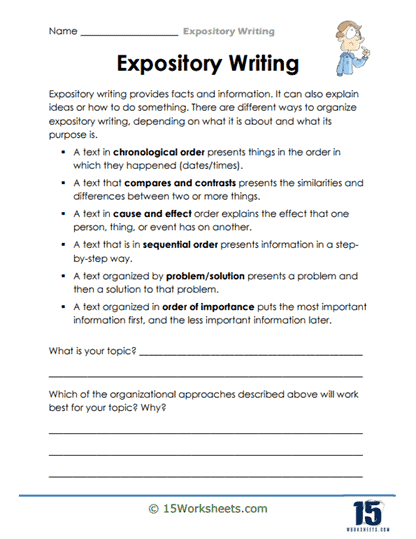

Different Expository Forms
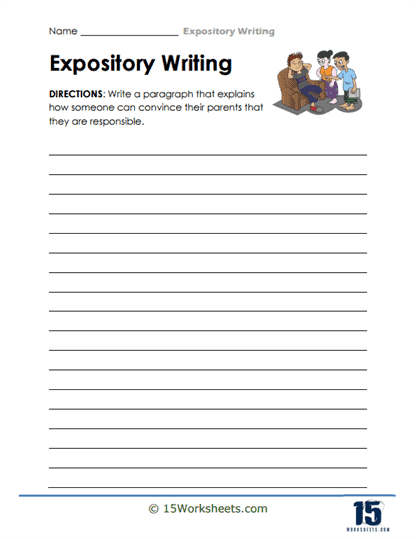
Convince Your Parents
About these 15 worksheets.
Expository writing is a form of writing that seeks to explain, inform, clarify, or expound on a subject. It’s a staple in academic settings and is commonly used in essays, reports, manuals, and textbooks. Its primary aim is to convey information in a clear, straightforward, and logical manner. Expository Writing worksheets are educational tools designed to develop and enhance students’ skills in this form of writing. They include various exercises targeting different aspects of expository writing, from structuring arguments to refining grammar.
Nature of Expository Writing
It is fact-based, focusing on exposing and explaining facts, concepts, or ideas. Unlike persuasive writing, it doesn’t include the author’s opinions or arguments but relies on factual and straightforward information. The primary purpose is to inform, explain, or describe. It’s widely used in educational materials, business reports, journalism, technical writing, and instructions.
Through a variety of exercises, these worksheets help in mastering the art of expository writing, from structuring arguments to refining grammar and vocabulary. This form of writing is crucial for academic success and professional communication, making these worksheets an invaluable component of educational curricula.
Types of Exercises
Structure and Organization Exercises – These exercises focus on structuring an expository piece, including the introduction, body paragraphs, and conclusion. This helps students understand how to organize their thoughts logically and coherently.
Topic Sentence Development – Activities that involve creating effective topic sentences that set the stage for the paragraphs. This enhances the ability to introduce the main idea of a paragraph clearly.
Evidence and Example Integration – Activities that involve using facts, statistics, or real-life examples to support the statements made. This enhances the ability to use evidence effectively to clarify and support the points made.
Transitional Phrases Usage – These exercises that involve using transitional words or phrases to ensure a smooth flow between ideas or paragraphs. Improves the readability of the text by creating logical connections.
Revision and Editing Tasks – These worksheets include revising and editing exercises to improve clarity, coherence, grammar, and punctuation. This encourages self-editing skills and attention to detail in writing.
Benefits of Practicing with Expository Writing Worksheets
Regular practice helps in developing a clear and concise writing style, essential for effective communication. It teaches students to avoid unnecessary details that can distract from the main message. By engaging in research-based exercises, students become adept at gathering and verifying information, a vital skill in academic and professional settings.
As students learn to support their statements with facts and examples, they develop critical thinking skills, learning to analyze and evaluate information critically. The process of writing, revising, and editing helps in refining grammar, vocabulary, and overall language proficiency. Expository writing is widely used in academic and professional contexts. Proficiency in this style is invaluable for success in these areas.
An Example of Expository Writing
Here’s an example of expository writing:
The Water Cycle – How Rain is Made
The water cycle is a fascinating natural process that helps create the rain we see falling from the sky. Imagine a big recycling system for water in nature! Let’s learn how this amazing cycle works.
Step 1 – Evaporation First, the sun shines its warm rays on lakes, rivers, and even the ocean. When the water gets heated by the sun, it starts to change into water vapor, which is like invisible steam. This process is called “evaporation.”
Step 2 – Condensation Next, the water vapor rises up into the sky. As it goes higher, it gets colder, and that makes the water vapor change back into tiny water droplets. These droplets come together to form clouds. This step is called “condensation.”
Step 3 – Precipitation Now, the clouds become heavy with all those water droplets. When they get too heavy, the water droplets fall from the sky as rain, snow, sleet, or hail. This falling of water is called “precipitation.”
Step 4 – Collection When the rain hits the ground, it doesn’t just disappear. It soaks into the soil and becomes part of rivers, lakes, and underground water sources. Animals and plants use this water too. This part is called “collection.”
And the cycle starts all over again! It’s like a never-ending journey for water in nature.
Why is the Water Cycle Important?
The water cycle is essential for life on Earth. It helps keep our planet’s water clean and fresh. Without this cycle, we wouldn’t have the rain we need for crops, or the water in our rivers and lakes. It’s also the reason we have beautiful rainbows when the sun shines through raindrops!
In conclusion, the water cycle is a natural process that keeps our planet’s water clean and provides us with the rain we need for many things. It’s like a big, amazing water adventure happening all around us every day.

- About Michelle Waters
- Curriculum Vitae
- Tools I Use
- Podcast Episodes
- How To Be Our Podcast Guest
- Member Login
- Member Helpdesk
- Support Portal
- Resource Partners
- Writing Partners
- Certificate Verification
- How To Contribute
by Michelle Boyd Waters, M.Ed.
28 Expository Writing Prompts for Middle School
October 12, 2014 in Pedagogy

The ability to provide information in different contexts is essential to effective communication. Students must practice expository writing throughout their academic careers. The sooner they start, the better. Below are some descriptive, sequential, compare and contrast, cause and effect, and problem/solution writing prompts to help you give your students the practice they need.
Descriptive
- Write an essay describing your school to a potentially new student.
- Write an essay describing the appeal of reality TV shows.
- Write an essay describing a rainy night.
- Write an essay describing your first pet.
- Write an essay describing your first memory.
- It’s Christmas morning and there is a package under the tree containing exactly what you requested. Describe the contents of your package..
- Write an essay describing how you feel when you wake up and discover snow on the ground outside — and school has been cancelled.
- Writing an essay explaining the process you use to style your hair in the morning.
- You have invited your two best friends to spend the afternoon at your home. Write an essay telling how your prepare for their visit.
- Everyone has lost something at one time or another. Write an essay telling what you did to find what you had lost.
- Describe how to make a peanut butter and jelly sandwich.
- Tell how you wash your hair.
- Describe the plot of your favorite book.
Compare and Contrast
- Write an essay comparing and contrasting ownership of cats and dogs.
- Compare and contrast this year in school to last year.
- Compare and contrast your two favorite characters.
- Compare and contrast your family’s home and the home of your dreams.
- Compare and contrast a typical day in your life today and what you think a typical day in your life will be like when you are 25.
- Compare and contrast your two favorite teachers.
Cause and Effect
- Write an essay telling how peer pressure has affected you this year.
- Write an essay explaining what causes students to drop out of high school.
- Discuss the causes and effects of bullying in schools.
- Discuss the causes and effects of poverty in rural (urban) areas.
- Discuss the causes and effects of drug or alcohol use on families.
Problem/Solution
- Most students do not read or watch news, resulting in a lack of knowledge about the world outside of their immediate neighborhood. Write an essay describing why this is a problem and telling how this problem might be solved.
- Think about the community in which you live. What could you do to make it a better place? Choose one problem that needs to be solved to make your community a better place to live. Write a letter to the editor describing how solving this problem would make your community a better place, and tell what you would do. Give reasons why you think your plan would work.
- Think about what you could do to make your school more beautiful. Think about how you would do this. How could you persuade the people in your school that your idea is a good one? Write a letter to the principal of your school asking for support for your plan for making your school more beautiful. Tell what you would do and how you would do it. Explain why you think your plan is important and why it would work.
- Think about animal abuse. Some people abuse animals by being intentionally cruel to them or neglecting their basic needs; others abuse animals out of ignorance. Think about what could be done to prevent both kinds of animal abuse. Write a letter to leaders in your community describing how you would solve this problem, and how treating animals better would improve the lives of animals and people. Explain why you think your plan will work.
Related topics: Informative Writing , Quickwriting
About the author
Michelle Boyd Waters, M.Ed.
I am a secondary English Language Arts teacher, a University of Oklahoma student working on my doctorate in Instructional Leadership and Academic Curriculum with an concentration in English Education and co-Editor of the Oklahoma English Journal. I am constantly seeking ways to amplify students' voices and choices.
- Pingback: Writing in the Middle School-Thoughts and Ideas | Teachers Pondering
the prompt should be harder,and including a think about and quote.
Thank you very much for your input, Amelia!
this info is very helpful and all but right now at school (i am in middle school) i have to write an expisitory essay on any topic i am really having trouble finding a topic but it has to be something u can argue like for example: football: people think it is a dangerous sport but the rules have changed more saftey… yeah stuff like that something u can argue ur opinion and so far i have nothing i was really hoping this would help but no but thx anyways i am gonna go to another website but in the future this could really help thx!!!!
But it makes your teacher happy to know what your input is for example what your input is about bullying and drugs.
Thank you so much for this. I need to give my 8th-grader, reluctant writer, some options for what he writes as practice on spring break. This is a great list. I added one about describing the appeal of the YouTube videos he watches, and another about the cause-and-effect of DOnald Trump’s candidacy, since my son is very interested in Trump.
Thank you this helped a lot when I didn’t know what to write for my essay.
I really like this website because i like writing essays for practice and these are a little difficult but It is good for it to be a little diffcult because it is more challenging.
These are great! I will be using these suggestions with my 6th graders! I love expository writing!!!! 🙂
Comments are closed.

IMAGES
VIDEO
COMMENTS
Use these 33 new prompts in your 1st, 2nd, and 3rd grade classrooms to help students learn the valuable skill of expository writing!
To help you get started with expository writing, let’s take a look at some popular, fun and useful expository writing prompts: 1. Who do you admire the most in the world? Why? 2. If you could be any animal for a day, what would you be and why? Master the Art of Writing the Academic Essay | By Charlene Gill. 3.
Expository Writing worksheets are educational tools designed to develop and enhance students’ skills in this form of writing. They include various exercises targeting different aspects of expository writing, from structuring arguments to refining grammar.
Your students will be provided sheets that examine the uses of expository writing-such as in compare and contrast essays, how-to essays, and informative essays-and be given several worksheets to complete a similar task. "Tip" sheets are included in each packet for ease of reference.
Students must practice expository writing throughout their academic careers. The sooner they start, the better. Below are some descriptive, sequential, compare and contrast, cause and effect, and problem/solution writing prompts to help you give your students the practice they need.
Expository writing exercises help students practice informing or explaining a topic to their readers, without leaning too much on opinions and instead focusing on facts. Learning how to write an informative essay is a lifelong skill that will carry readers through their entire education.